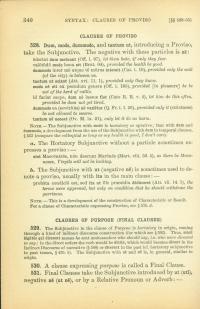528. Dum, modo, dummodo, and tantum ut, introducing a proviso, take the subjunctive. The negative with these particles is nē.
Ōderint dum metuant. (Off. 1.97)
Let them hate, if only they fear.
valētūdō modo bona sit (Brut. 64)
provided the health be good
dummodo inter mē atque tē mūrus intersit (Cat. 1.10)
provided only the wall (of the city) is between us
tantum ut sciant (Att. 16.11.1)
provided only they know
modo nē sit ex pecudum genere (Off. 1.105)
provided [in pleasure] he be not of the herd of cattle.
Id faciat saepe, dum nē lassus fīat.(Cato R. R. 5.4)
Let him do this often, provided he does not get tired.
dummodo ea (sevēritās) nē variētur (Q. Fr. 1.1.20)
provided only it (strictness) be not allowed to swerve
tantum nē noceat (Ov. M. 9.21)
only let it do no harm
Note— The subjunctive with modo is hortatory or optative; that with dum and dummodo, a development from the use of the subjunctive with dum in temporal clauses, § 553 (compare the colloquial so long as my health is good, I don't care).
a. The Hortatory Subjunctive without a particle sometimes expresses a proviso.
Sint Maecēnātēs, nōn deerunt Marōnēs. (Mart. 8.56.5)
So there be Mœcenases, Virgils will not be lacking.
b. The subjunctive with ut (negative nē) is sometimes used to denote a proviso, usually with ita in the main clause.
Probāta condiciō est, sed ita ut ille praesidia dēdūceret. (Att. 7.14.1)
The terms were approved, but only on condition that he should withdraw the garrisons.
Note— This is a development of the construction of characteristic or result. For a Clause of Characteristic expressing Proviso, see § 535.d.

